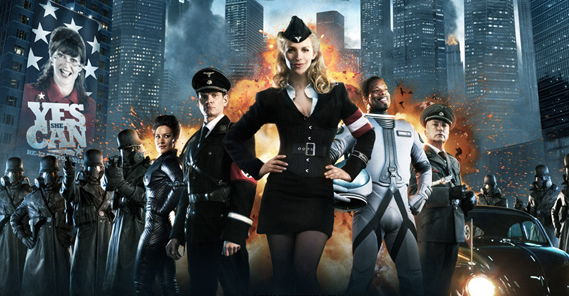|
It is the
year 2018.
Sarah Palin is the incumbent president of the United States of the
Americas. As
part of a harebrained re-election campaign, she launches two
astronauts, one of
them being a black male model named James Washington (Christopher
Kirby), over
to the dark side of the moon. Washington’s partner discovers a mine for
a
mysterious element known as Helium-3 before a Nazi sentinel quickly
murders him.
Washington tries to flee but gets captured. As it turns out, the Nazis
relocated
to the moon and built a colony after Hitler’s totalitarian regime
collapsed in
1945. The Nazis spare Washington so that they can use him to reach
Palin. They
also use his smartphone to charge up their titanic aerial spacecraft,
the Gotterdammerung.
However, after the phone’s battery drains, they are forced to dispatch
their
top soldier, Klaus Adler (Gotz Otto), and his future wife-to-be, Renate
Richter
(Julia Dietz), an Earth specialist, out to the U.S to obtain another
energy
source. Palin, who is desperate to find the perfect solution for her
re-election woes, uses Adler and Richter to formulate a successful
Nazi-themed re-election
campaign, unaware of Adler’s secret plans to annihilate the U.S
populace,
eliminate Fuhrer Kortzfleisch (Udo Kier) and install himself as the
next leader
of the lunar Nazis. The ensuing chaos, in short, leads to an all-out
intergalactic war, conceived as an obvious prism for America’s foreign
affairs
and a vehicle for the film’s satiric geopolitical critique, if that.

Timo
Vuorensola’s Iron Sky is a fantastical farce with
otiose
caricatures, sophomoric political humour and repulsive genre fusion. It
recalls,
in parts, an eclectic range of films including for instance, Trey
Parker’s Team America: World Police (2004), for
the thematic angles it uses, Jason Eisiner’s Hobo with a
Shotgun (2011), for the nausea that its defective
execution and dystopian aesthetic induce, Tommy Wirkola’s Kill
Buljo (2007), for the bemusing and deadening satiric humour
that undoes its bid to besmirch its intended target(s) and Quentin
Tarantino’s Inglourious Basterds (2009), for its
manipulative representations of the Nazi imaginary. Sci-fi,
geopolitical, cultural,
futuristic and historic tropes all jostle for the viewer’s attention
without
conveying anything meaningful. Even
if the film’s criticism of America’s tragicomic political history and
megalomaniacal self-image is somewhat recognisable as its overriding
thesis, its
flexuous narrative arc works against its goal and its arbitrary
conclusion dulls
its impact completely. To an extent, the film can be forgiven for its
committed
lunacy, seeing as its entire premise is
built towards excess as opposed to
restraint, however, the lunacy itself is not justified owing to the
film’s
infinitesimal payoff. An execrable effort that should be avoided by all
means
necessary.
|